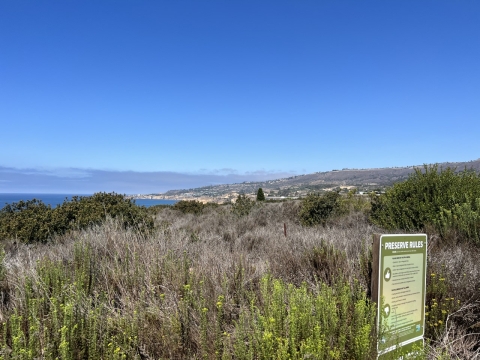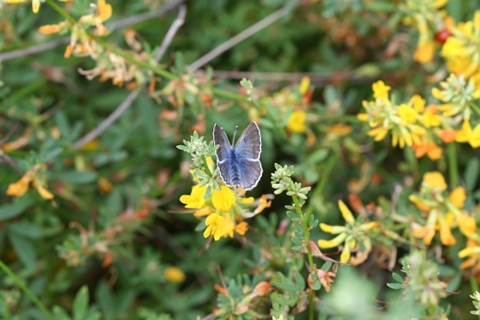The weather was perfect on August 26 when representatives from the Carlsbad Fish and Wildlife Office joined with its partners from the Palos Verdes Peninsula Land Conservancy (PVPLC), California Department of Fish and Wildlife, California Wildlife Conservation Board, City of Rancho Palos Verdes (City), and County of Los Angeles (County) to celebrate the acquisition of 96 acres of land on the Palos Verdes Peninsula in Los Angeles County.
Rising above the blue waters of the Pacific Ocean, the Palos Verdes Peninsula offers the best ocean views in the county and is known for its pricey real estate. Less well known, but more importantly, the Peninsula is home to the endangered Palos Verdes blue butterfly and threatened coastal California gnatcatcher. Conservation of the acreage provides an opportunity to support additional recovery efforts for these species, among others, as well as serves as a wildlife corridor wildlife corridor
To maintain healthy species populations and ecosystems, fish and wildlife need the freedom to move and migrate. As habitats and migration routes are affected by climate change and fragmented by roads, fences, energy development and other man-made barriers, wildlife struggle to reach necessary areas to feed, breed and find shelter. A wildlife corridor is a piece of undeveloped land connecting two habitats so wildlife can move safely between them.
Learn more about wildlife corridor connecting other conserved habitat that makes up the Preserve system managed by the PVPLC. The acquisition consisted of two properties owned by one landowner.
Mary Beth Woulfe, a fish and wildlife biologist at the Carlsbad FWO who is the office’s coordinator for the section 6 Cooperative Endangered Species Conservation Fund, spent nearly 20 years working alongside the property owner, the PVPLC, State agencies, and the City to finally achieve the successful purchase of the land.
“I want to thank everyone for putting the energy and the effort in to make sure this place remains protected forever; we know how hard it is to make these happen,” said Ed Pert, regional manager for the California Department of Fish and Wildlife. “I want to thank the Service and particularly Mary Beth for her dogged perseverance.”
Of the $21 million total purchase cost, $12.6 million was provided through the Federal section 6 grant program, plus $4.8 million from the State, $1.3 million from the PVPLC, $1.3 million from the City, and $1 million from the County.
“This section 6 grant was the largest given by the Service in the nation last year, demonstrating the importance of this land to conserving Southern California’s biodiversity,” said Jonathan Snyder, assistant field supervisor for the Carlsbad FWO.
The acquisition complements the City of Rancho Palos Verdes Natural Communities Conservation Plan/Habitat Conservation Plan which was permitted in 2020. The plan established a 1,400-acre preserve system protecting habitat and providing connectivity for a wide variety of plants and animals.
“We are proud to have partnered with such a committed group of visionaries that has worked tirelessly for decades to bring this important conservation project across the finish line,” said Woulfe. “The dedication of these partners is inspiring and a testament to how much can be accomplished for the land and its wildlife through collaborative planning.”
The PVPLC is now embarking on an effort to restore habitats on the property for the Palos Verdes blue butterfly and other species, including the Monarch butterfly.
“This landscape represents renewed hope for wildlife and a healthy environment for generations
to enjoy,” said Adrienne Mohan, executive director for the PVPLC. “With broad community support, we will revitalize the healthy ecosystems of the land with native plants for an array of critically imperiled wildlife.”






